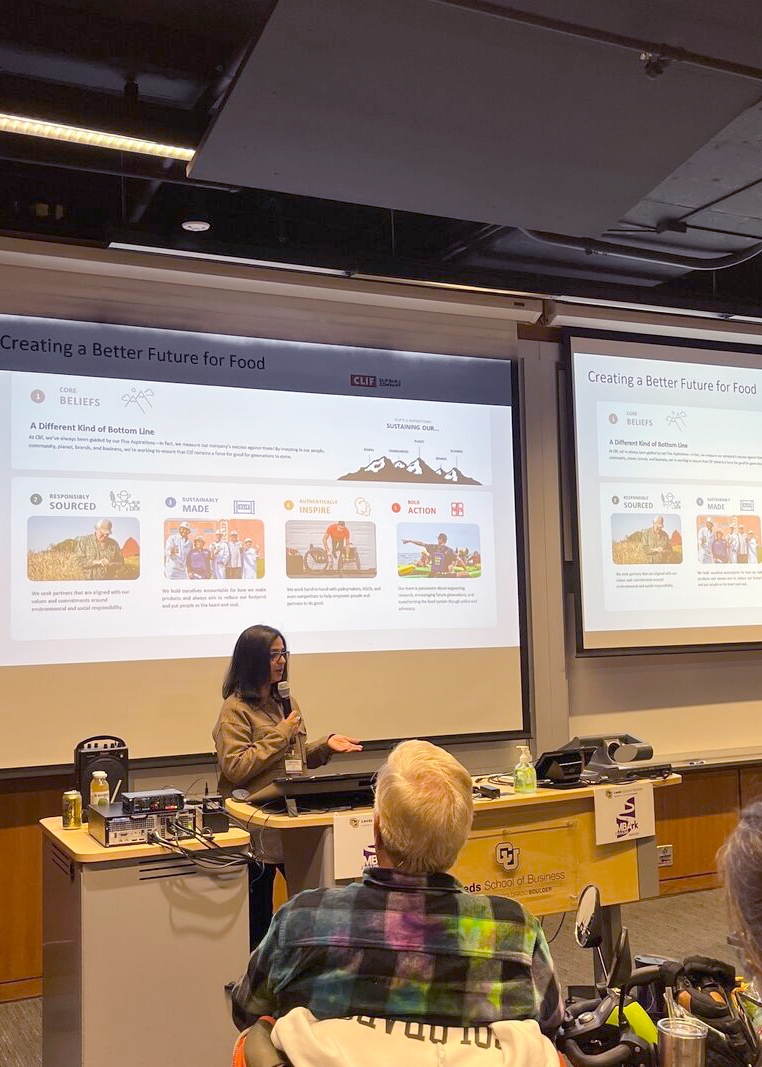
Earlier this year, I attended the MBArk Sustainability & Food Leadership Conference at the University of Colorado Boulder Leeds School of Business. The trip was made possible through funding provided by the Center for Business Government & Society and the Revers Center for Energy, Sustainability & Innovation. The conference hosted over 30 speakers and nearly 100 attendees, covering salient topics from soil to shelf—including regenerative agriculture, sustainable packaging, and the climate change narrative. While every speaker was phenomenal, a few sessions stood out as particularly insightful or inspiring.
The Regenerative Revolution — Gene Kelly, Colorado State University
Pedology is the study of soil science, and is an increasingly important topic for business leaders to become fluent in. Soil filters water, reduces flooding, regulates the atmosphere, stores carbon, and is home to one of the most diverse habitats on the planet. While the great success of the global agricultural system has led to an astonishing ability to feed a rapidly growing population, innovation has come at the cost of degrading topsoil, which is responsible for 95% of global food production. Responsible food systems leaders should consider the impact their actions have on soil health and look for practices that align social, economic, and ecological incentives for food production.

CPG Sustainability — Darcy Shiber-Knowles, Director of Operational Sustainability & Innovation at Dr. Bronner’s
Dr. Bronner’s is a unique company in that it embodied stakeholder capitalism before the term was brought into public consciousness. The company has a deep commitment to public good, as is evidenced by its record-breaking B-Corp rating. Their transparency on the challenges they seek to address—moving away from plastic packaging and shifting a global producer network to regenerative farming practices—not only builds consumer trust but also helps drive speedier progress. For example, the presentation noted an article published on the company blog, which by communicating vulnerability in sustainable packaging challenges, led directly to innovative ideas, partnerships, and pilot opportunities. Showcasing openness in sustainable transitions is important—no organization has all the answers, and collaboration is required to achieve the change we envision. I appreciated the insight that successful organizations treat sustainability horizontally rather than vertically. Sustainability should be embedded in every function of the business, rather than operating in a silo, and Dr. Bronner’s is a company leading that evolution.
Changing the Narrative — LeeAnn Kittle, Director of Sustainability at Denver Public Schools
There are a staggering number of children who feel anxiety, fear, or even guilt over a climate crisis they did not cause. This state of despair can be stupefying, leading to inaction simply because the problem feels too big to even know where to start. Denver Public Schools aims to shift youth sentiment on sustainability from one of despair to one of empowerment by assigning each school its own sustainability project to be led by students. The Denver Public School Climate Action Plan is a playbook for educators to reduce emissions, conserve natural resources, and better prepare students for an emerging green economy—I hope more school districts follow their lead.
I left the conference feeling inspired. Surrounding myself with like-minded students, speakers, and professionals allowed me to return to Hanover from winter break feeling refreshed and motivated. I left with new insights, connections, and an expanded perspective on what it means to lead food systems change as a business leader.
Of course, the journey does not end in Boulder. At Tuck, I have the opportunity to engage with like-minded students in a number of academic, professional, and experiential learning opportunities. Planning the 2023 Virtual Summit on Ag and Food Tech at Tuck; taking coursework on Current Issues in the Global Food System; and seeking an internship in early-stage innovation are experiences that allow me to stay connected to topic areas I am passionate about.
If you are excited about addressing the health, economic, and environmental challenges facing our food system like I am, there is opportunity for you in Hanover. And if you are at all interested in sustainability, I highly recommend attending the conference in the future.
Thank you to Joe Dobrow and the University of Colorado Boulder Leeds School of Business for hosting the event—and Tuck for making my trip a possibility!